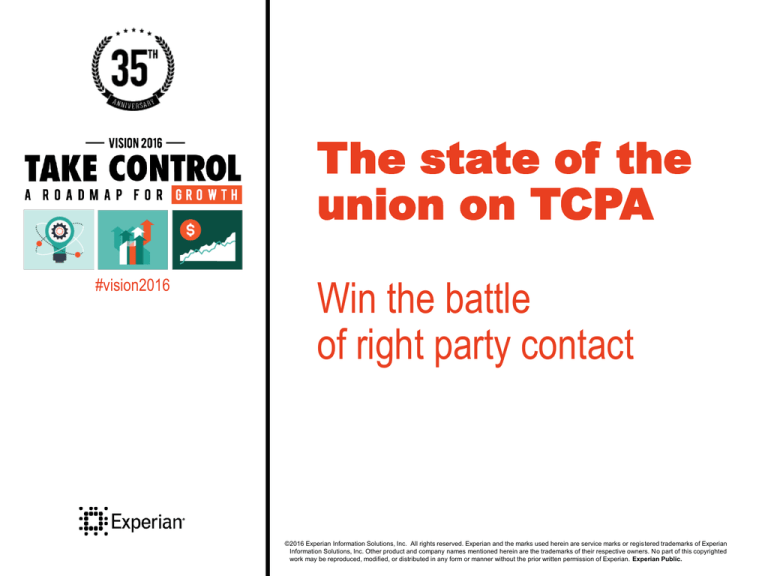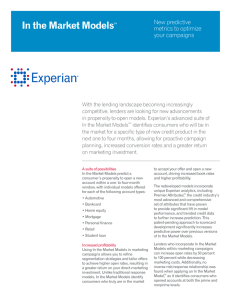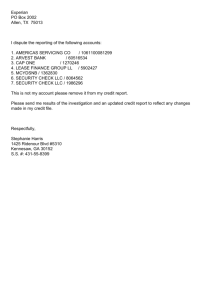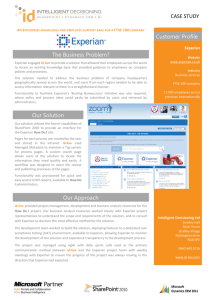
The state of the
union on TCPA
#vision2016
Win the battle
of right party contact
©2016 Experian Information Solutions, Inc. All rights reserved. Experian and the marks used herein are service marks or registered trademarks of Experian
Information Solutions, Inc. Other product and company names mentioned herein are the trademarks of their respective owners. No part of this copyrighted
work may be reproduced, modified, or distributed in any form or manner without the prior written permission of Experian. Experian Public.
Introducing:
Tom Gilbertson
Venable LLC
#vision2016
Brian Gourlay
Bank of America
Tony Hadley
Experian
MaryAnne Gorman
Experian
© 2016 Experian Information Solutions, Inc. All rights reserved.
Experian Public.
“
Be a yardstick
of quality. Some
people are not used
to an environment
where excellence is
expected.
”
— Steve Jobs
© 2016 Experian Information Solutions, Inc. All rights reserved.
Experian Public.
#vision2016
3
Discussion agenda
What is TCPA?
FCC’s July 2015 Declaratory Ruling
What is “prior express consent”?
Exemption for government debt
TCPA litigation trends
FCC regulations
on wireless phones
Panel discussion: where do we go
from here?
#vision2016
© 2016 Experian Information Solutions, Inc. All rights reserved.
Experian Public.
4
What is the TCPA?
A focus on non-telemarketing calls
The TCPA is a Consumer Protection
Act that prohibits two actions:
►
►
Making telemarketing calls
to residential telephones
using a pre-recorded voice
without prior express
written consent
Making non-emergency calls
using an auto-dialer or prerecorded voice to a wireless
phone without prior
express consent
Debt collection and nontelemarketing calls require prior
express consent and are the focus
of this Vision session
#vision2016
© 2016 Experian Information Solutions, Inc. All rights reserved.
Experian Public.
5
FCC’s July 2015 Declaratory Ruling
No change to “express consent”
for non-telemarketing calls
Revoking consent
Clarifies and broadens the definition
of an “auto-dialer”
Reassigned cell phone numbers
Requirement for “one call” without liability
Text messages
Government debt
#vision2016
© 2016 Experian Information Solutions, Inc. All rights reserved.
Experian Public.
6
Prior express consent
What constitutes prior express consent
For informational and other non-marketing calls, including
debt collections, prior express consent means that a
consumer has knowingly released their phone numbers,
thereby given their permission to be called at the number
Prior express consent may be obtained in an application
for credit
Prior express consent may be granted verbally
or in writing or verbally
May by obtained through notifications, fraud alerts
and surveys
Calls marketing messages must meet a different standard:
prior express written consent!
#vision2016
© 2016 Experian Information Solutions, Inc. All rights reserved.
Experian Public.
7
Prior express consent for debt collections
Requires prior express consent, written
or oral, when made to a consumer cell phone
using an auto-dialer
No telemarketing messages!
If prior express consent was obtained
in an application for credit, its best practice
to ensure that consumer understands this
to mean authorization to contact consumers
related to payments
Consent may be obtained and conveyed
to intermediaries, such as debt collectors
#vision2016
© 2016 Experian Information Solutions, Inc. All rights reserved.
Experian Public.
8
Revoking consent
Consumers may revoke consent in any manner that clearly expresses a desire
not to receive further messages
Callers may not infringe on or control the means by which consumer may revoke
their prior express consent – for example by designating an exclusive means
#vision2016
© 2016 Experian Information Solutions, Inc. All rights reserved.
Experian Public.
9
Definition of auto-dialer
The definition of auto-dialers is broadly interpreted
to include a wide array of calling equipment
and software with the “capacity to dial random
or sequential numbers”
►
This includes equipment that may lack
the “present ability” to dial randomly
or sequentially, but can be modified to fit
this definition
Ultimately the order’s definition of an autodialer
is unlikely to assist regulated entities manage
legal risk and seems to further lead to a case-bycase analysis
#vision2016
© 2016 Experian Information Solutions, Inc. All rights reserved.
Experian Public.
10
Reassignment of cell phone numbers
The porting of a residential wire line phone to a mobile phone
number does not revoke a consumer’s prior express consent
If the consent obtained for the wire line number satisfies the prior express
consent requirement for wireless phones, then the caller may continue to rely
on that consent to make autodialed or prerecorded calls to the ported number
#vision2016
© 2016 Experian Information Solutions, Inc. All rights reserved.
Experian Public.
11
Requirement for “one call” without liability
If a phone number is reassigned
to a new consumer, a company
cannot rely on the prior owner’s
consent to avoid liability
Companies can place one call to
a reassigned number without obtaining
the new owner’s prior consent
#vision2016
© 2016 Experian Information Solutions, Inc. All rights reserved.
Experian Public.
12
TCPA exemption for government debt
The Bipartisan Budget Act of 2015 (effective
November 2, 2015) amends the Telephone
Consumer Protection Act (TCPA)
Creates exemptions for calls made to cellular
and residential telephone numbers solely
for collection of debts owed to or guaranteed
by the U.S. Government
Servicers and collectors of government debt
are included in the exemption
#vision2016
© 2016 Experian Information Solutions, Inc. All rights reserved.
Experian Public.
13
Litigation trends
Industry challenges FCC’s July 2015 Declaratory Ruling
ACA International v. Federal Communications Commission
(D.C. Cir. 2015)
Various trade associations and marketers challenge FCC’s July 2015
Declaratory Ruling
►
ATDS definition is unlawfully vague under APA and constitution
►
“Called party” definition is contrary to TCPA and unconstitutionally vague
►
►
►
“One free call” rule fails to establish constructive knowledge of and
reasonable opportunity to discover reassignment, therefore fails to cure
constitutional deficiencies of “called party” definition
Revocation of consent treatment is unlawful because it makes compliance
impracticable and imposes disproportionate burdens
Current status
#vision2016
© 2016 Experian Information Solutions, Inc. All rights reserved.
Experian Public.
14
Litigation trends
Courts still struggling with vague ATDS definition
Whether human intervention and other aspects of a telephone system
permit an ATDS ruling as matter of law
“Capacity to dial numbers without human intervention.” In re: Rules & Regulations
Implementing the TCPA of 1991, 23 FCC Rcd. 559 (2008)
“[D]efinition of autodialer does not extend to every piece of malleable and modifiable
dialing equipment that conceivably could be considered to have some capacity,
however small, to store and dial telephone numbers.” 2015 FCC Order
Freyja v. Dun & Bradstreet, Inc. (C.D. Cal. Oct. 14, 2015) (granting summary judgment
where challenged calls were made with desktop phone, not autodialer)
Luna v. Shac, LLC (N.D. Cal. Aug. 15 2015) (granting summary judgment because
human intervention was required for texts to plaintiff’s cell phone)
Glauser v. GroupMe, Inc. (N.D. Cal. Feb. 4, 2015) (summary judgment appropriate
where no dispute about whether defendant’s equipment had capacity to dial numbers
without human intervention)
#vision2016
© 2016 Experian Information Solutions, Inc. All rights reserved.
Experian Public.
15
Litigation trends
Courts still struggling with vague ATDS definition
Whether human intervention and other aspects of a telephone system
permit an ATDS ruling as matter of law
In re: Collecto, Inc. (D. Mass. Feb. 10, 2016) (while some prior act of human agency
occurred, FCC’s auto-dialer definition turns on whether dialing requires human intervention)
Stewart v. T-Mobile USA, Inc. (D.S.C. Aug. 28, 2015) (dismissal motion defeated by
allegations about calls that support inference of ATDS use, including repeated calls
containing prerecorded message intended for another recipient)
Galbreath v. Time Warner Cable, Inc. (D.N.C. Dec. 22, 2015) (use of pre-recorded voice
obviates dispute about whether system constitutes ATDS)
McKenna v. WhisperText LLC, (N.D. Cal. Sept. 9, 2015) (dismissed complaint challenging
automated, unsolicited texts prompted by users of social app, holding that user prompts
constituted sufficient human intervention to forestall ATDS finding and user was initiator
of the challenged call under FCC’s July 2015 Order)
Moore v. DISH Network LLC (N.D.W.Va. 2014) (TCPA prohibits ultimate calling
from the list by automated equipment without human intervention)
Sherman v. Yahoo! Inc. (S.D.Cal. Dec. 14, 2015) (human intervention claims insufficient
#vision2016
to support summary judgment based on FCC 2015 Order and assertion that the
determination must be made on a case by case basis
© 2016 Experian Information Solutions, Inc. All rights reserved.
Experian Public.
16
Litigation trends
Consent parameters remain arguable after FCC 2015 Order
Competing case law about whether consent reaches other users
of cell phone and whether consent could be revoked when provided
as part of earlier contract
Galbreath v. Time Warner Cable, Inc. (D.N.C. Dec. 22, 2015) (relying on 2015 FCC Order
to resolve conflicting case about whether and how prior express consent may be revoked
and denying summary judgment)
Miceli v. Orange Lake Country Club (M.D.Fla. Aug. 5, 2015) (dismissal motion denied
where complaint alleged counsel’s letter of representation constituted revocation
of consent to telephone debtor directly)
Johnson v. JPMorgan Chase (S.D.Tex. Nov. 18, 2015) (granting defendant summary
judgment where plaintiff failed to substantiate revocation of prior consent)
Stewart v. T-Mobile USA, Inc. (D.S.C. Aug. 28, 2015) (dismissal motion defeated
by plaintiff’s assertion that she revoked consent by following prompt to speak
with live representative and asked that T-Mobile not call her on her cell phone)
#vision2016
© 2016 Experian Information Solutions, Inc. All rights reserved.
Experian Public.
17
Litigation trends
Unintended call recipient issues continue to plague TCPA cases
Disputes about who is the “called party” with standing to sue under
TCPA: intended recipient who consented, or actual party answering
the challenged call?
Leyse v. Bank of America (3d Cir. 2015) (roommate of consenting intended recipient
had standing to bring TCPA case because he fell within the zone of interests as regular
user of phone line who occupies the residence being called. “Called party” defense
remains for caller to assert later in case)
Moore v. Dish Network LLC (N.D.W.Va. 2014) (rejecting argument that only intended
recipients have standing under TCPA, and trebling damages on calls made after
plaintiff notified defendant that he was not intended recipient)
Gensel v. Performant Tech., Inc. (E.D. Wisc. Oct. 20, 2015) (staying case pending
industry appeal of FCC 2015 Order, but finding that ruling about definition of “called party”
is unlikely to be overturned)
#vision2016
© 2016 Experian Information Solutions, Inc. All rights reserved.
Experian Public.
18
Litigation trends
Class settlement case study
Gehrich v. Chase Bank and JPMorgan Chase Bank (N.D. Ill. March 2, 2016)
Approved $34 million class-wide settlement of TCPA claims
►
Over 32 million account holders receiving SMS or voice alert calls
►
July 1, 2008 to December 31, 2013 class period
►
$52.50 cash per class member fell within range of prior class settlements
►
$18 million class benefits, $5 million admin costs; $9.5 million attorney fee award
►
Different treatment of credit card v. checking account holders
►
Large class size made individual resolutions administratively unmanageable
►
►
Recognizes difficulty of establishing consent on class-wide basis, and notes pendency
of industry appeals challenging FTC 2015 Order
$1 million cy pres award resolves claims of alert call subclass
#vision2016
© 2016 Experian Information Solutions, Inc. All rights reserved.
Experian Public.
19
PANEL DISCUSSION
Where do we go
from here?
© 2016 Experian Information Solutions, Inc. All rights reserved.
Experian Public.
#vision2016
20
Panel discussion
Q&A
What's coming in the next 12-18th
months
Where is my biggest regulatory risk?
What am I missing?
What is being required in
documentation and controls?
What should I be doing with my
third party agency partners?
How can I prepare for an audit?
What are my biggest risks and
pitfalls?
How can Experian help me?
© 2016 Experian Information Solutions, Inc. All rights reserved.
Experian Public.
#vision2016
21
Where do we go from here?
Experian Contact Solutions are designed to provide you the insight
you need for a complaint contact strategy
These solutions are helping our clients win the battle of TCPA
Compliance, reducing wrong party contact and verifying
telephones numbers before calling
Our consulting solutions are giving you access to industry experts
to assist with strategy design and efficiency
►
Telephone appends
►
Cell vs. landline separation
►
Data hygiene
►
Portability
►
Channel preference
►
Telephone number verification
►
Calling optimization
►
Consulting services
#vision2016
© 2016 Experian Information Solutions, Inc. All rights reserved.
Experian Public.
22
For additional information,
please contact:
#vision2016
Tony.Hadley@experian.com
MaryAnn.Gorman@experian.com
Follow us on Twitter:
@ExperianVision | #vision2016
© 2016 Experian Information Solutions, Inc. All rights reserved.
Experian Public.
23
Share your thoughts about Vision 2016!
Please take the time now to give us your feedback about this session.
You can complete the survey in the mobile app or request a paper survey.
1
© 2016 Experian Information Solutions, Inc. All rights reserved.
Experian Public.
Select the Survey
button and complete
2
Select the breakout
session you attended
#vision2016 24
© 2016 Experian Information Solutions, Inc. All rights reserved.
Experian Public.
#vision2016 25




